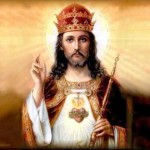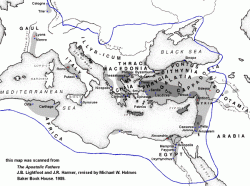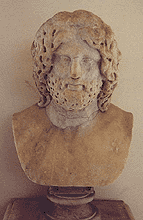Bonitas non est pessimis esse meliorem.
Being better than the worst is not goodness. - Seneca
(Bissette, 2009, para. 16)
Christianity and Jesus

Jesus
Before Christianity came along, Romans worshiped gods like the Greeks' only with different names. They believed that spirits and other divine forces were constantly among them, and these religious figures were like humans in looks and personalities. Additionally, spirits, called Lares, were like "guardian angels" to each family. This style of religion was very impersonal, but the government was still closely tied to it, which was why it was hard, initially, for Christianity to spread.
Well, in 63BC, the Roman Empire conquered modern day Israel, but at that time, people recognized it as Judea. The Jewish population was concentrated here. Jewish kings (sanhedrins) still ruled Judea, but they reported to Rome. Some of the kings even mixed Roman customs into their ruling. One example was King Herod. You may recognize him from the Bible. He was the one that ordered all first born males to be killed. The following ties into Christianity, because Jesus was Jewish when he preached, and was often in Judea--which is Roman! There was a group of people in Judea called zealots. These people did not like being under Roman rule and caused some revolts. In response, in 6 AD, Rome made Judea a province, and the natives had less power and freedom. This, in turn, prompted some Jewish to wait for a Messiah.....
OK, so when Jesus is around 30 years old, he begins preaching. He had the twelve disciples who followed him around. You might almost call them understudies, because they watched what Jesus did and learned from it. Jesus taught monotheism (the belief in one God, like Jewish). He incorporated some Jewish traditions in his teachings as well, specifically the Ten Commandments. Also, importantly, he told people they could have a personal relationship with a God who loved them and did not care about social status.
Jesus died at the hand of Pontius Pilate, well, not literally, but he was a leader of Rome at the time. Since Jesus called himself "king of Jews" and the Messiah, he was a threat the REAL king of Jews, Pontius Pilate. Plus, Jesus had many followers, so he was worried everybody may follow/obey Jesus instead of himself. Well, Pilate sentenced Jesus to be crucified on the Cross; that's how Christianity got its symbol the cross. Additionally, after three days Jesus rose from the dead, and the spurred the actual beginning of Christianity. It is neat to note that many Jewish were waiting for a Messiah, but some of them did not believe Jesus was the one. They thought he was a fake, and thus, did not favor him. Modern day Jewish believe Jesus was a prophet.
The Jewish continued to have problems even after Jesus' death. They continued to rebel, and in 70AD, the Romans burnt down the Temple of David--one of the Jews' holy places. Then in 132 AD, Emperor Hadrian got sick of the rebellions and told Jews they must leave or be killed. Many Jews settled in Germanic areas of Europe. That event is known as the Diaspora.
But back to Christianity. A man named Peter spread Christianity. Another man, named Paul, spread Christianity during the Pax Romana, mainly in Syria and Palestine. It's an interesting story with Paul. He used to be a pagan and was not Christian and was actually named Saul. One day he received a message from God, and then, he made it his mission to spread Christianity. The spread of Christianity was successful because of the Pax Romana. People could travel and spread ideas relatively easily and safely. No big wars were happening. In the late 200's, about one million Christians lived in the Roman Empire.
Even with the popularity of Christianity, Christians were persecuted. For people who worshiped Roman gods, they murdered Christians to respect their gods. Often times, the Christians posed a threat to the government of Rome, especially if the emperor claimed god given power. After all, if Christianity was true, they were big fat liars! Sometimes, Christians were used as scapegoats, like in Nero's case. Also, some persecuted Christians were put into the Colosseum as gladiators. Christians that were persecuted were known as martyrs. They sacrificed their lives for something they believed--God. That's why there are many saints from this time period.
In 312 AD, Constantine made Christianity his religion, and people were allowed to practice Christianity freely. This was when Christianity really took off. With so many Christians in the empire, people needed common beliefs and a place to come together with other Christians. Thus, the church was formed! It consisted of the church, obviously. These were localized and led by a priest. A bishop then supervised a group of local churches; Peter was the first formal bishop and the guide for all others. Most high is the POPE. All of the other [Roman Catholic] churches follow and listen to him. (At this time, there was really only one denomination) He is considered the bishop of Rome... Rome was the headquarter of Christianity. Peter was also the first Pope and he is an ancestor to all Popes.
Other important dates:
325AD the Nicene Crede is written. It brought the beliefs of all Christians together/clarified their beliefs. In 380AD, Theodosius made Christianity the official religion of the Roman Empire.
"Why was Christianity a world religion?
It embraced all people
It gave hope to the powerless
It appealed to those who were repelled by the extravagance of Rome
It offered a personal relationship with God
And it promised eternal life after death" (Beck, R, et al, 2003, p. 156)
More websites to explore:
http://www.pbs.org/wgbh/pages/frontline/shows/religion/maps/christ.html
http://www.eduplace.com/kids/socsci/ca/books/bkf3/imaps/AC_14_463_christianity/AC_14_463_christianity.html
http://www.iun.edu/~hisdcl/h113_2001/christianity1.htm
A video about the Life of Paul:
http://www.youtube.com/watch?v=OUJaGlFJBjY
Review
What were the Roman gods like? What was their religion like?
Why are the Jewish important when learning about Christianity?
How did being under Roman rule change the Jews?
What were zealots?
Why did some Jews not like Jesus? Why didn't the Roman government like Jesus or Christians?
Why was Christianity so popular?
Who was Paul? How did he spread Christianity?
Why was the Pax Romana such a good time to spread religion?
What is the Diaspora?
Why was Constantine important for Christianity? How did he affect it?
Why are the Jewish important when learning about Christianity?
How did being under Roman rule change the Jews?
What were zealots?
Why did some Jews not like Jesus? Why didn't the Roman government like Jesus or Christians?
Why was Christianity so popular?
Who was Paul? How did he spread Christianity?
Why was the Pax Romana such a good time to spread religion?
What is the Diaspora?
Why was Constantine important for Christianity? How did he affect it?


